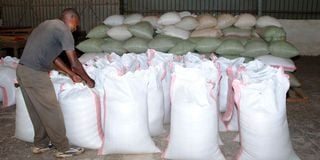Premium
Food imports hurt farmers

A farmer delivers his maize at the National Cereals and Produce Board in Elburgon, Molo. The government’s plan to replace Kenyan-grown foods with foreign ones is not fair to local farmers and to the entire nation.
The government’s plan to replace Kenyan-grown foods with foreign ones is not fair to local farmers and to the entire nation.
Treasury Cabinet Secretary Njuguna Ndung’u said in a gazette notice that the government planned to import 900,000 tonnes of maize grain, 600,000 tonnes of milled rice and 100,000 tonnes of sugar.
Rift Valley and western Kenya farmers have expressed their concerns over the government’s reluctance to buy their maize. Kirinyaga farmers have more than 400,000 tonnes of rice while Mumias Sugar Company grinds over 2,000 tonnes of sugar daily.
Why would the government allow food imports, probably at a higher price than that in farmers’ stores? What is the cost of a bag of maize, a bag of rice and one tonne of sugar, including the purchase price and transportation, when imported from abroad versus that bought from the Kenya farmer?
Our leaders, who are notorious for looting public funds, are creating a lot of suspicion and fear by planning to import foods which are available in the country, sending new signals of an intention to introduce a situation similar to the one which necessitated controversy over maize imports in 2009.
Sincere, honest and transparent MPs should table a motion in the House demanding that the government break down the cost of importing maize, rice and sugar compared to when bought locally. That will avert suspicion of corruption in the decision.
Lastly, further introspection into the decision to buy food from abroad as opposed to Kenyan farmers is necessary to promote the idea of eventual self-sufficiency in food security in Kenya. That is because Kenya farmers will be motivated to do more farming of food crops.
Dr Kinity, PhD, a counsellor and human rights activist based in the US, is a former secretary-general of Kenya Civil Servants Union. [email protected].





